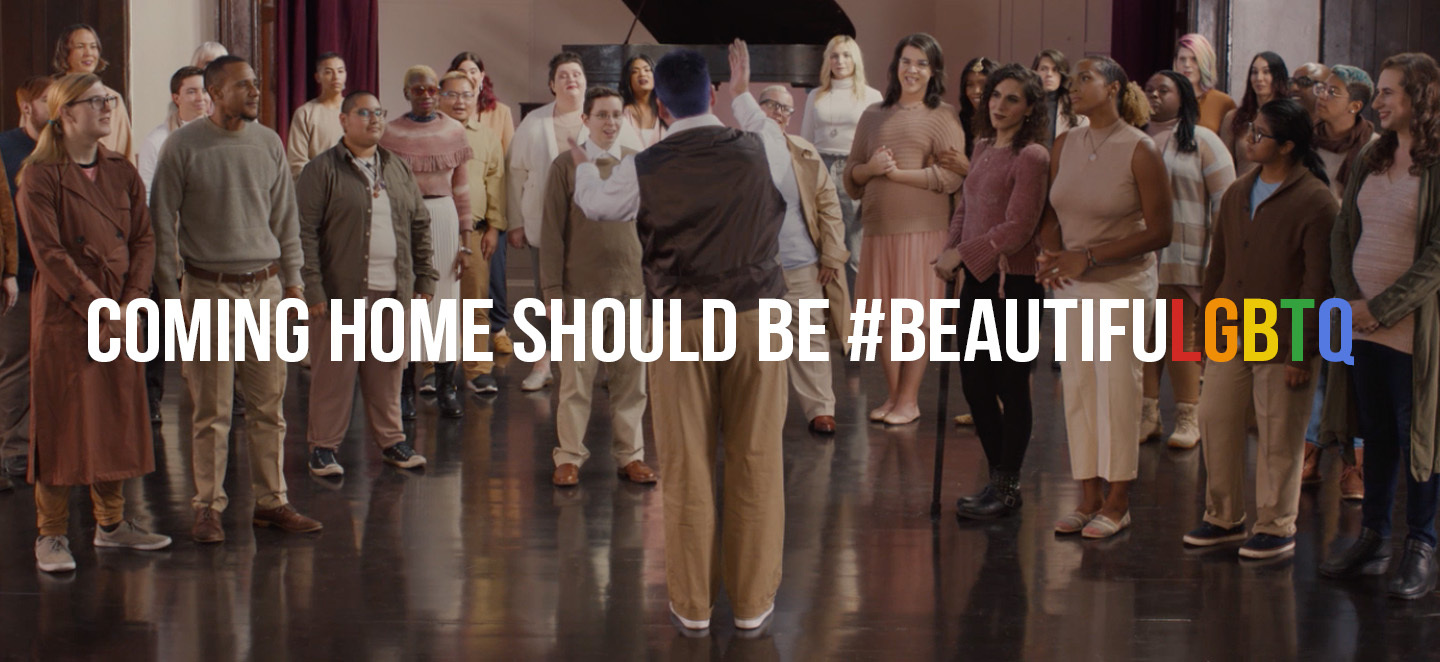
For transgender and gender-nonconforming people, going home for the holidays can be a fraught experience — as can any family get-togethers or social interactions. But a new ad campaign from beauty company Pantene and LGBTQ advocacy organization GLAAD reminds that their families (or chosen families) can play a big part in making them feel welcome as their true selves.
“Pantene is setting the standard for authentic inclusion of LGBTQ people and stories among brands that transcend industries,” said Sarah Kate Ellis, the President and CEO of GLAAD. “LGBTQ stories need to be told by brands outside of Pride month and Pantene is demonstrating a real commitment to LGBTQ storytelling with this moving holiday video. Especially around the holidays when too many LGBTQ people feel isolated, it’s so important to remind community members who celebrate with families –— chosen or otherwise — that they are beautiful.”
The ads feature the Trans Chorus of Los Angeles singing the holiday classic “I’ll Be Home for Christmas” and tells the stories of a series of trans and gender nonconforming people as they travel to their version of “home” for the holidays. Each explains what it meant for them to be accepted by their family — or a chosen family (close bonds which queer people cultivate to replace a possibly unsupportive biological family).
As the ads were created by Pantene, which has used social justice issues in ad campaigns before, those featured emphasize why choosing to grow out their hair — or to cut it off — was significant to them as part of the journey to expressing their own individual identity.
One ad features Miliana, or “Lana,” a trans woman who grew up in Haines City, Florida. Lana explains that growing out her hair became an important part of her transition — as well as a point of contention with her father.
“To me, my hair was like my strength, my femininity, it was my character,” Lana says. “My dad was not a fan of me growing my hair out. He ended up shaving my head bald, and that was a very tough time for me. To lose something that meant the world to me in an instant, I thought that was kind of where things were going to be and he would never come around.”
Lana says that her father told her he would never accept her. But five years later, she says, he called her “his daughter” and “baby girl.” At last, she says, she feels she can go home for the holidays and feel welcome.
“Now, to go home for the holidays means that I have sense of community and family. It’s just an amazing sense of comfort to be back. I just feel like that’s where my heart is.”
A lack fo family support can have serious consequences for transgender people. LGBTQ advocates say that while support from families can be a major factor in the well-being of transgender people, especially trans youth, a lack of support can be a major source of suffering. Advocates say that rejection can put people at risk of mental health issues, behavioral problems and homelessness; transgender people, especially transgender women of color, are also particularly vulnerable to violence.
According to GLAAD, families can play an important part in helping their trans family members have a happy holiday season, and a positive relationship. The advocacy organization advises that family members should be prepared to check in with their trans relatives to ask how they can best be supportive — and be prepared to take action as an ally.
More Must-Reads From TIME
- The 100 Most Influential People of 2024
- The Revolution of Yulia Navalnaya
- 6 Compliments That Land Every Time
- What's the Deal With the Bitcoin Halving?
- If You're Dating Right Now , You're Brave: Column
- The AI That Could Heal a Divided Internet
- Fallout Is a Brilliant Model for the Future of Video Game Adaptations
- Want Weekly Recs on What to Watch, Read, and More? Sign Up for Worth Your Time
Contact us at letters@time.com